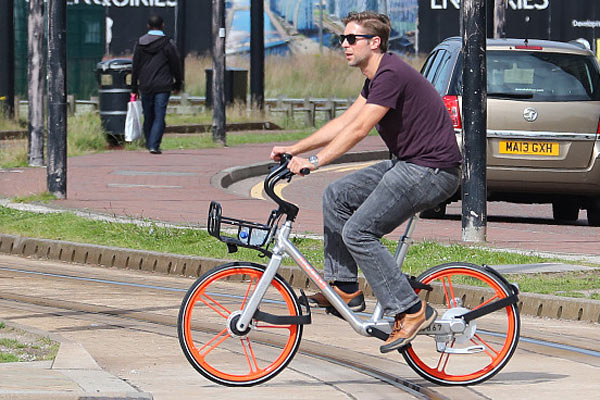China's Mobike fills a gap in UK sharing economy
 |
|
A man rides a Mobike earlier this month in Manchester, UK. The company placed 1,000 bikes in the city in June. Rival Chinese company Ofo is making a similar effort in Cambridge. [Photo provided to China Daily] |
Within a few weeks of the launch of Chinese bike-sharing company Mobike in Manchester, United Kingdom, local resident James McConnell had already used the bikes more than a dozen times.
"They are easy to use, great for short distances, and I've never been unable to find a bike when I needed one," said McConnell, 33, a postdoctoral research associate at the University of Manchester, who often cycles from the university to other parts of the city.
Mobike's launch of 1,000 bikes in Manchester last month is one example of how China's burgeoning sharing economy is spreading to the UK. Rival bike-sharing company Ofo is making a similar effort in Cambridge.
Bike sharing in the UK is not new. In London, Santander Cycles is widely used. But Mobike and Ofo are challenging the status quo by not requiring consumers to return the bikes to fixed docking stations and by cutting the price.
This small detail is hailed by British scholars as an innovation within the theory of the sharing economy.
"This holds a very high potential to foster characteristics that research has identified as crucial for successful sharing schemes: flexible, individual and on-demand mobility," said Antje Graul, a doctoral researcher in marketing at Leeds University Business School.
Graul added that Mobike and Ofo's use of tracking data, locking mechanisms, secure and easy mobile payment, and competitive pricing strategies are other winning advantages.
Diane Coyle, a professor of economics at the University of Manchester, said Mobike was smart to spot a gap in the market and target Manchester, a city that had no bike-sharing program. She said what will determine success will be whether it can reach critical mass quickly enough.
Mareike Moehlmann, assistant professor of information systems and management at Warwick Business School, added that Mobike's current low charge of 50 pence (65 US cents) for 30 minutes is not an impediment to future profitability, because once scale is achieved it can raise prices.
"It might not cover all their expenses and they may run at a loss, but once network effects take hold and they have built a big consumer base, they can then increase prices," Moehlmann said. "It is an investment for the future."
Looking beyond bike-sharing program, Coyle said there could be room for other ideas from the Chinese sharing economy that could succeed in the UK, especially costly items that are not used all the time. Items that fit those characteristics include cars, lodging and parking in driveways.
Lower-cost items tried in China, such as umbrellas or laundry services, are far less likely to succeed, Coyle said.






















